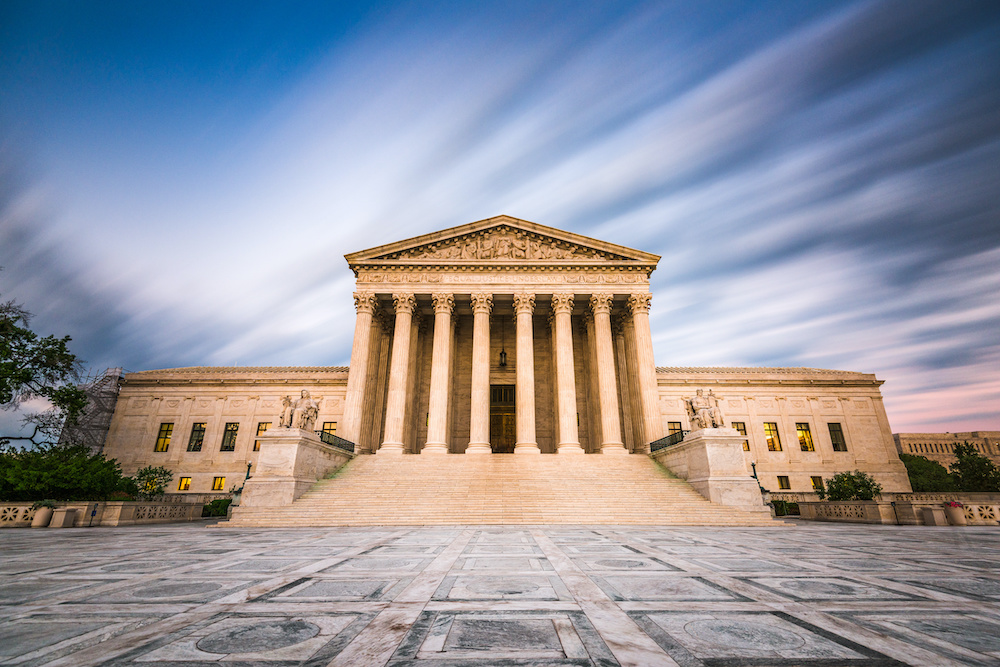
- Details
- By Native News Online Staff
The Mandan, Hidatsa, and Arikara (MHA) Nation, along with Native voters Cesar Alvarez and Lisa Deville, have submitted an amicus brief in defense of Section 2 of the Voting Rights Act (VRA) during the U.S. Supreme Court's review of Louisiana v. Callais (consolidated with Robinson v. Callais). This case challenges a fair district map enacted by the Louisiana legislature after Black Louisianans demonstrated that the previous redistricting map unlawfully diluted Black votes. The Native voters and the MHA Nation aim to uphold federal laws that protect voters from gerrymandering and ensure fair democratic elections in the United States.
The MHA Nation and Native voters are experienced in such litigation, having previously defended the creation of a North Dakota legislative subdistrict in Walen v. Burgum. Under Section 2 of the VRA, lawmakers must consider and respect political boundaries—such as Tribal Nation reservation boundaries—when drawing district lines to ensure that communities within those boundaries have a fair opportunity to elect representatives of their choice. To comply with Section 2, the North Dakota Legislature established House District 4A, a subdistrict aligned with the MHA Nation’s reservation boundaries, enabling MHA voters to elect their candidate of choice.
The Walen v. Burgum lawsuit sought to dismantle District 4A. However, the Native voters and the MHA Nation successfully defended it, alongside the state of North Dakota, in district court. Despite this victory, the legal status of the subdistrict is now before the U.S. Supreme Court. In a surprising turn, the North Dakota Attorney General has requested the Court overturn the district court decision that upheld the creation of the MHA subdistrict.
“Like the Black voters advocating for a fair election map in Louisiana, Native voters in North Dakota have also had to file lawsuit after lawsuit to vindicate their right to vote. For many Americans, this unending civil rights struggle requires fighting in the courts for legal redistricting maps that allow their votes to count,” said Native American Rights Fund Staff Attorney Lenny Powell.
In their Callais amicus brief, the Mandan, Hidatsa, and Arikara (MHA) Nation and Native voters, represented by the Native American Rights Fund (NARF) and the Campaign Legal Center, urge the Court to reverse the district court's ruling that Louisiana’s current congressional map constitutes an unconstitutional racial gerrymander. The brief highlights that the U.S. Supreme Court previously rejected similar arguments made by elected officials in the 2023 decision of Allen v. Milligan. Additionally, the MHA Nation and Native voters counter mischaracterizations presented in an amicus brief filed by 12 states in the Callais case. That brief attempts to distort both the legal victory achieved by Native voters in Walen v. Burgum and the fundamental purpose of Section 2 of the Voting Rights Act.
“This case is an attempt to strip Black voters in Louisiana of their right to equal representation. When a minority group is continually denied the opportunity to elect its chosen candidates, then our democracy cannot be said to be truly inclusive of all voters regardless of race or ethnicity. The Supreme Court should reject this attempt to undermine the protections of the Voting Rights Act and allow to stand the map adopted by Louisiana to provide fair representation to Black voters while maintaining other important state goals,” said CLC Senior Vice President Bruce Spiva.
More Stories Like This
Native News Weekly (August 25, 2024): D.C. BriefsUS Presidents in Their Own Words Concerning American Indians
Next on Native Bidaské: Julian Brave NoiseCat on the Lumbee Nation’s 140-Year Fight for Federal Recognition
Hackers Compromise Native News Online Facebook Page
‘His stories can no longer be told.’ | Woman Pleads Guilty to 2016 Murder of Indigenous Master Woodcarver
Help us defend tribal sovereignty.
At Native News Online, our mission is rooted in telling the stories that strengthen sovereignty and uplift Indigenous voices — not just at year’s end, but every single day.
Because of your generosity last year, we were able to keep our reporters on the ground in tribal communities, at national gatherings and in the halls of Congress — covering the issues that matter most to Indian Country: sovereignty, culture, education, health and economic opportunity.
That support sustained us through a tough year in 2025. Now, as we look to the year ahead, we need your help right now to ensure warrior journalism remains strong — reporting that defends tribal sovereignty, amplifies Native truth, and holds power accountable.
 The stakes couldn't be higher. Your support keeps Native voices heard, Native stories told and Native sovereignty defended.
The stakes couldn't be higher. Your support keeps Native voices heard, Native stories told and Native sovereignty defended.
Stand with Warrior Journalism today.
Levi Rickert (Potawatomi), Editor & Publisher


